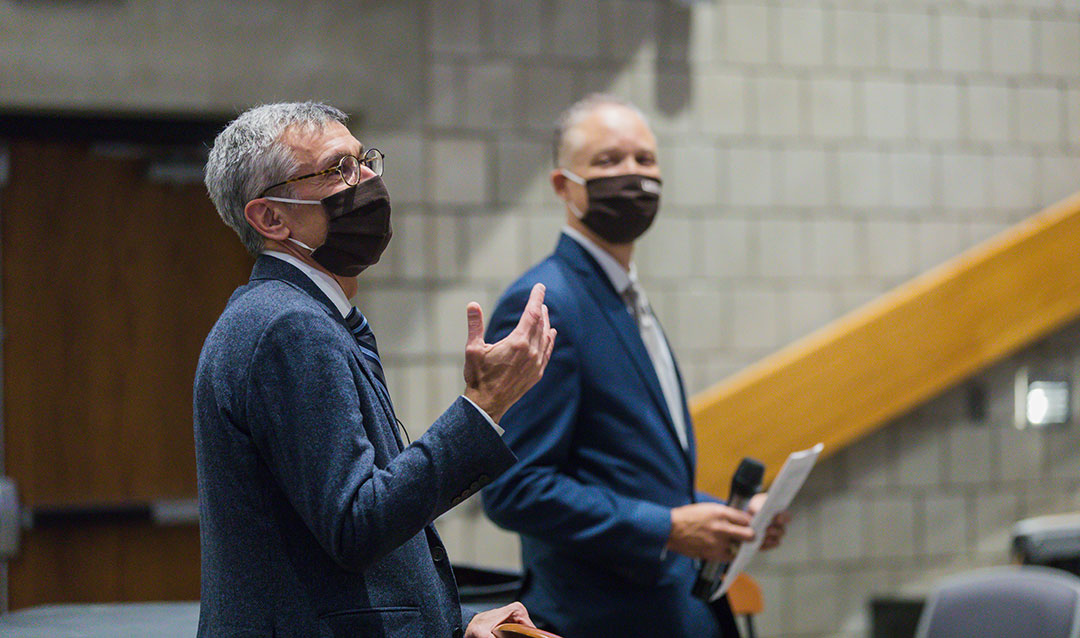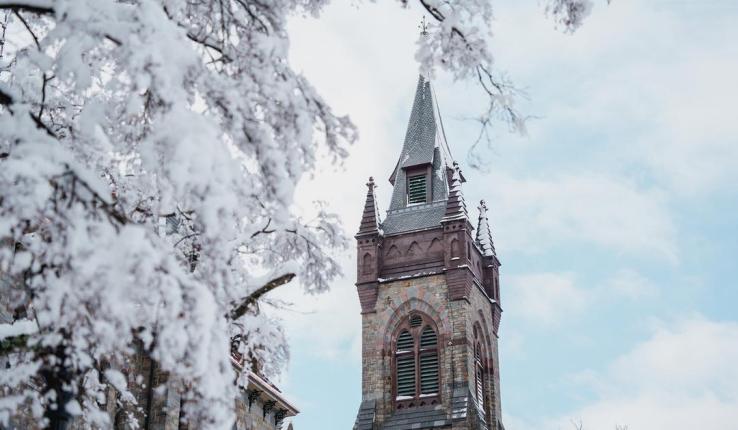Inside Lehigh’s Lewis Lab, where he once took a memorable physics course as an undergraduate, Lehigh President Joseph J. Helble ’82 fielded questions from faculty, students and staff and discussed a wide range of topics Tuesday that included interdisciplinary learning, supporting and retaining employees, and strategic planning.
“As you ask questions, if you ask questions,” he told those gathered, “I’d be interested in hearing about the issues that are on your mind today.” But also, he said, he wanted attendees to “think about the promise of this incredible university … how we can be even better, even more impactful and have an even better experience for our students, thinking five, 10 years down the road. … Let’s talk about that because part of our reason for asking these questions is not only to get a sense of the community's perception of who we are today, but to get a sense of your aspirations, [and] our shared aspirations, for the Lehigh in years to come.”
Faculty, students and staff joined the in-person event at 4 p.m. in Lewis Lab, followed by the virtual event at 7 p.m.
Since returning to Lehigh, Helble said, he has been asking faculty, students and staff about their Lehigh experience: What brought them here? If they’re an alumnus, what brought them back to work here? Why do they stay? They point to the natural beauty of the campus and their academic experiences, he said, as well as the sense of community—from the faculty and staff who mentored them to the lifelong friendships forged.
Helble said he’s found that Lehigh’s students are interested in big ideas. “But what they seem very interested in,” he added, “is taking those ideas and using that learning to address problems confronting society today, not 30 years from now, but today—getting out in the world, making a difference. And I find that inspiring.”
As he also disclosed in his inaugural address and in a video message to the Lehigh community, Helble told those gathered that he sees an opportunity for Lehigh to build on its strong, interdisciplinary programs to better prepare students for the world they will encounter when they graduate so that they can be ready to contribute to their organizations and community and adjust to the shifting changes in the workforce. That’s the reason, he said, that he has asked his team to expand the number of students who can be admitted into Lehigh’s signature interdisciplinary programs—such as IDEAS [Integrated Degree in Engineering, Arts and Sciences], CSB [Computer Science and Business] and IBE [Integrated Business and Engineering]. He also said he wants to explore creating new interdisciplinary programs that include the College of Health and make core elements of Lehigh’s five colleges available to all undergraduate students.
Helble said he plans to start the process for updating and reviewing Lehigh’s strategic plan, last published in 2009.
“Let's take a look at where we have made progress against those goals,” he said. “Let's take a look at where we didn’t make progress and ask ourselves, are those goals still right, or has the world changed so significantly that we should recalibrate?”
In the question-and-answer segment that followed, Helble was asked how Lehigh can better invest in the time it takes for faculty from its different colleges and departments to learn from one another, and how to ensure that students explore curricula across disciplines earlier in their time at the university.
Helble said the process of strategic planning will provide an opportunity to raise questions that get at the heart of those issues, such as: What are the structural curricula impediments that prevent such exploration among students? He said that the university might also consider being more strategic in the composition of its faculty committees. “Maybe that’s one way to facilitate some of those conversations,” he said.
Asked about supporting and retaining faculty and staff, Helble acknowledged that the past 18 months have been exhausting for the Lehigh community as the university dealt with the pandemic and quickly transitioned to online learning to continue supporting its students.
“Take a look at the extraordinary transformation that happened literally overnight, because the future of our students was at stake,” he said.
While the students’ excitement to be back on campus is palpable with the return of in-person learning, Helble said, he realizes the toll it has taken on the faculty and staff. Helble said the issue is not isolated to Lehigh, and that he’s had similar conversations with other university presidents. Going forward, he said, Lehigh will need to find ways to help its staff and faculty manage the workload more effectively.
Helble said that it is important to him to have “open and honest conversations about challenging issues,” and if the Lehigh community found Tuesday’s events to be valuable, he would like to hold similar forums each semester with faculty, students and staff.
“At the end of the day, we are a community with shared aspirations, shared goals, excellence in what we do and a real responsibility for providing the best possible education or research opportunity for the students we have the privilege of teaching.”





